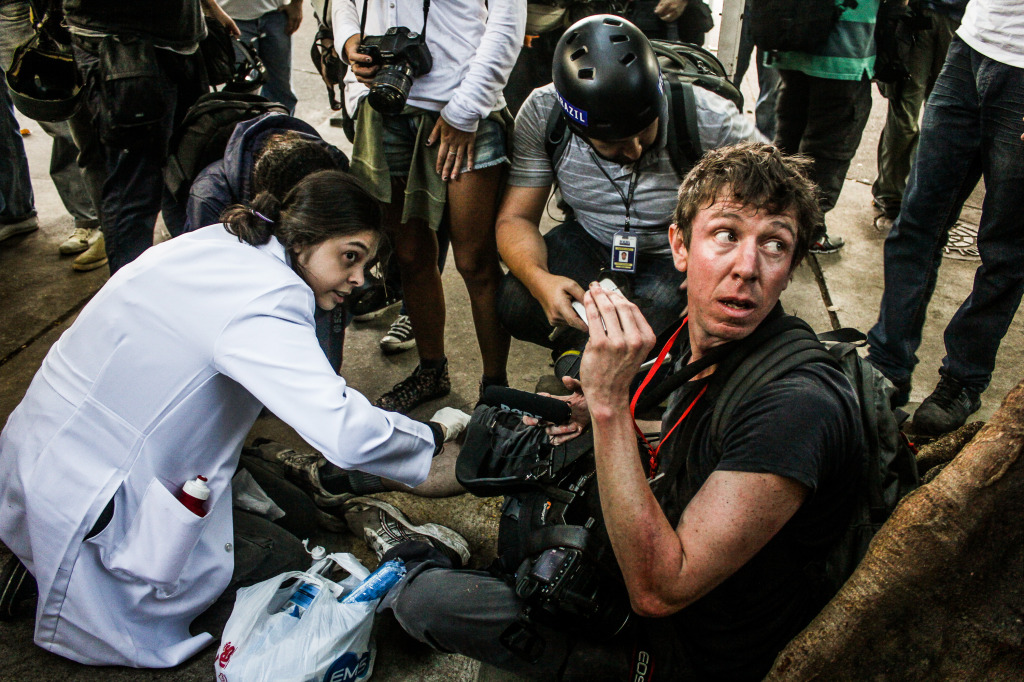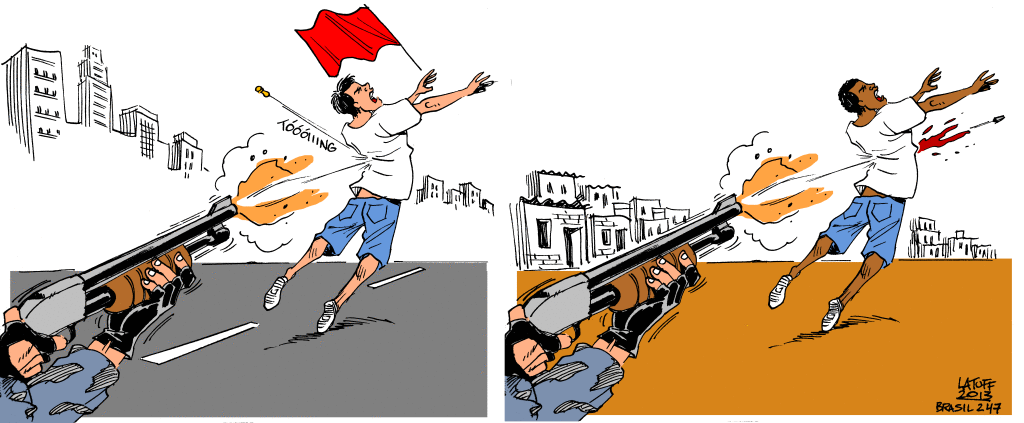As international tourists descended on Rio’s iconic Maracanã Stadium to watch the final match of the 2014 FIFA World Cup in July, most Brazilians watched from television screens outside, while others took to the streets to exercise their constitutionally guaranteed right to protest. It is not mere opportunism that is bringing people to the streets, seeking to capitalize on all the attention garnered by the Cup – their grievances are very much tied to the international spectacle and the social legacy it will leave in this country. When the circus leaves town, it is Brazilians who will bear the brunt of the hangover, sifting through the trash to recover all the discarded beer cans after the party. It is very true that these events bring extraordinary benefits, but to whom are these benefits accrued? The benefits are privatized and profit an international elite – FIFA and the event sponsors – while the costs are socialized. FIFA will pay no taxes in Brazil and commit one of the greatest heists in Brazilian history upon its citizenry.
The grievances being expressed in the streets are multi-fold: thousands of families forcefully evicted from their homes (often brutally, by riot police firing tear gas and rubber bullets); gross overspending on the stadium and other event-related infrastructure, while basic public services such as health care, education and basic sanitation are left unaddressed; and the militarization of the favelas in Rio, through the so-called favela “pacification” program. Initially, “pacification” brought much hope to communities that had long been suffering from the violence associated with criminal gangs and militias; however, these hopes were dashed through egregious abuses by a new gun-toting gang perpetrating summary executions and disappearances, this time with official sanction. One of the most notable examples of this new form of brutality is that of Amarildo Dias de Souza last year in the favela of Rocinha, whose case was only investigated after the international outcry following his disappearance. There was nothing particularly special about Amarildo’s case – there have been thousands of other Amarildos – but the timing of the incident coincided with one of the largest civil uprisings in Brazilian history, and the Brazilian people were fed up.
Another international media storm erupted in Rio in July, this time a “gringo” documentary filmmaker from Canada (me) was beaten up by a handful of police officers at a protest near Maracanã Stadium during the FIFA World Cup final. While the police have been beating, torturing, and disappearing poor “favelados” for a long time, on this occasion they had overstepped their duty and swung their batons at one of the international visitors they were tasked to protect. The fact that this relatively minor incident garnered so much international media attention is emblematic of precisely the inequalities Brazilians are protesting against in the streets – the transformation of the urban landscape in Rio and throughout Brazil to serve people like me, international tourists and international capital, at the expense of the people who actually live here. While the police repression we have been seeing in the streets of Rio during protests is egregious, it’s a relative picnic when one considers the much worse lethal violence perpetrated by Brazilian police who kill, on average, five citizens every day. The vast majority of cases are not so much as investigated, let alone prosecuted, and the culture of impunity runs deep among Brazilian policing institutions. The victims are almost always poor black favela dwellers.
For the World Cup Finals, Rio saw one of the largest mobilizations of military and police forces in Brazilian history since the dictatorship, and it was not Brazilian citizens they were there to protect – rather, they were protecting FIFA and the associated global capital interests. The police were sent to the streets to brutally repress and censor any dissidents who might spoil the party. Theoretically, policing should be about citizen security; unfortunately, in Brazil, policing institutions are a legacy of the dictatorship, at which time police were not tasked to protect the citizenry. On the contrary, their role was to protect the State from its citizens, the so-called “internal enemy” – the political dissident. And so, in the modern context, in the shadow of the dictatorship, the brutality we are seeing in the streets is a logical manifestation of this philosophy, without contradiction.
While it’s easy to dismiss my experience as an unfortunate incident perpetrated by a handful of “bad apples,” I think it wise for us all to take pause and consider the systemic context whereby the police are themselves victims of Brazil’s oppressive political system under global capitalism. Most police are themselves favela dwellers who are poorly paid, poorly trained, and are (in most cases) pursuing a career in policing for lack of other opportunities – much like African-Americans in the United States, who are represented twice as much in the military as they are in the US population. This is not to dismiss the egregious violence perpetrated by a handful of the police, but amongst any mass harvest (the “thousands of new jobs created by the World Cup”), there are bound to be more than a few bad apples.
As most of the world watched the World Cup finals from the comfort of their homes, bars, and restaurants in cities and towns across the globe, we should not forget the real cost of creating this spectacle – both the financial and social costs paid by Brazilians, who will be coping with the legacy of this event for years to come. The police sent to the streets for the World Cup were not serving Brazilians – they were serving FIFA, serving you, and protecting the status quo from the inevitable resentment that is going to boil up in host countries when the circus comes to town and doesn’t consult or invite the people hosting the party. When FIFA and IOC come to town, a “state of exception” is imposed, justified by the accelerated expediency required to prepare for such events. It is an exemplary legal framework that temporarily suspends the rule of law, and strangles civil liberties such as the right to free movement and protest, among many others (such as housing rights in the case of the forced community evictions).
It might assuage our collective conscience to tell ourselves that our relative comfort is hard-earned through our own efforts, but such reductionist thinking dismisses the fact that much of our privilege rests on the backs of the global majority who constitute the oppressed classes of the world. From the shirts on our backs to the fantastic sporting events like the FIFA World Cup and Olympic Games, all are served to us through a global economic system that disenfranchises the majority to the benefit of the few. As consumers of these global spectacles, we are all implicated in this story. The responsibility for injustices like I endured in July, and the much worse injustices suffered by Brazilians every day, is for all of us to bear.

